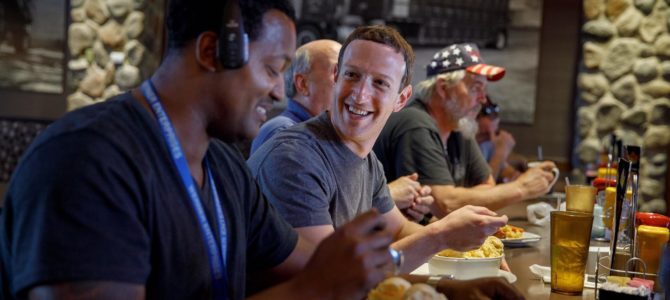Greetings from lovely Aspen, Colorado, where I am attending the Aspen Ideas Festival as part of their scholar program. I have no idea how I ended up in this program, as I did not apply for it, and my relationship with the Ideas Festival over the years has been mostly made up of mocking their event subject matter on Twitter (“Rotary: rediscovering the beauty of a phone which expects something of us, as opposed to the reverse” #aspenideas). But I am here nonetheless, ready for the live recording of PodSaveAmerica and the session on whether Robots are the future of Jazz. Already I have had a lovely conversation with a fellow attendee about one particular Aspen Idea: That Mark Zuckerberg would actually be a great candidate for president in 2020.
I am serious. Or at least, they were. But there is an internal logic to it, if you think of the problems plaguing America as being the lack of a leader who balances technocratic globalism with a more attuned sense of voter priorities and West Coast communitarianism. Zuckerberg has been traveling across the country of late meeting with all sorts of communities, making for increasingly odd pictorials of the young tech billionaire chatting with people very much unlike him. But we shouldn’t assess Zuckerberg’s awkwardness as a crippling defect in a field that is likely to be made up of people almost 40 years older than he is. Zuckerberg would enter such a contest with the greatest knowledge of the electorate and analytics of any candidate. (He also comes with his own deep state, and enough blackmail for half the country: “Mr. President, why no nominee for AG yet?” “I dunno, Jim, why do you spend so much time looking at those old pictures of Tammy from Waco?”) Awkward insistence didn’t stop Democrats from nominating Al Gore, and he came a lot closer to winning the presidency than John Kerry and Hillary Clinton. Zuckerberg is Gore as technocratic god, with a self-made mythology to go with it.
What’s more, Zuckerberg himself seems to have confidence that his creations can solve all your problems and make the world a better place – a level of hubris that we should not underestimate, given the fact that similar internal motivations resulted in the current president. See his most recent declaration that Facebook can be your church, which sounds as if he’s someone paying attention to Robert Putnam:
“With 100 million users taking part in what Zuckerberg called “meaningful communities” within Groups on Facebook, he spoke of his ambition to raise that number to a billion. He said: “If we can do this, it will not only turn around the whole decline in community membership we’ve seen for decades, it will start to strengthen our social fabric and bring the world closer together.”
“Comparing the site to a church, he went on to talk about the need for “great leaders” in such a community, saying: “A church doesn’t just come together. It has a pastor who cares for the well-being of their congregation, makes sure they have food and shelter.” He went on to say: “People who go to church are more likely to volunteer and give to charity – not just because they’re religious, but because they’re part of a community.”
This is highfalutin claptrap, of course. There is nothing a Facebook group offers that can substitute for the Eucharist. But if you view a church primarily as a community organizing utility, Zuckerberg’s assumptions make a great deal of sense. Don’t assume that this strain of conversation among the technocratic gods of our age is going to subside – in fact, given the degradation of so many other aspects of community in the country during this time of tribalism, they may offer a ray of hope to people desperate to feel a sense of belonging, no matter how ephemeral. In an era when we ask our politicians not merely to manage government or secure our liberties but to provide a sense of salvation, this can be a powerful if utterly wrongheaded message. And it is one Zuckerberg seems inclined to keep delivering, despite its obvious falsehood.








